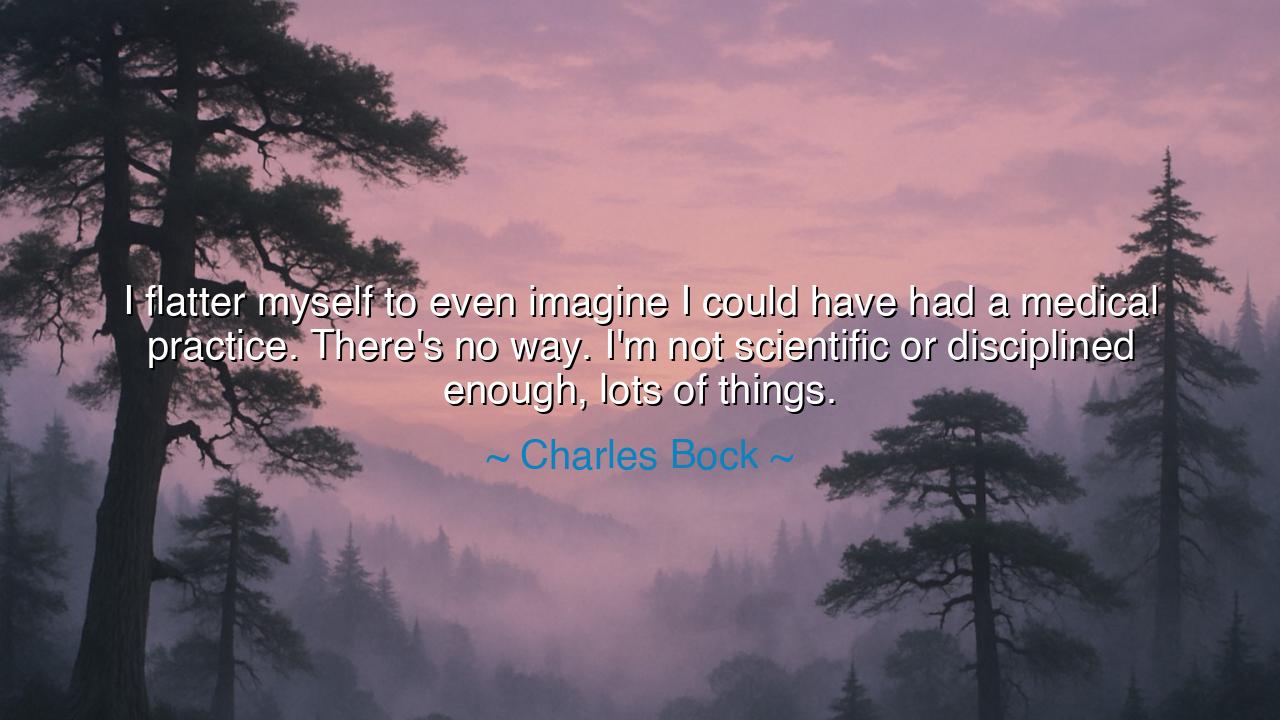
I flatter myself to even imagine I could have had a medical
I flatter myself to even imagine I could have had a medical practice. There's no way. I'm not scientific or disciplined enough, lots of things.






The words of Charles Bock are humble, self-revealing, and touched with wisdom: “I flatter myself to even imagine I could have had a medical practice. There’s no way. I’m not scientific or disciplined enough, lots of things.” Though they seem simple, they are, in truth, the confession of a soul that has looked inward with honesty and found peace in its own nature. They speak not of failure, but of self-awareness—the courage to know one’s limits and to honor the gifts that lie elsewhere. For there is as much nobility in knowing what one cannot do as in triumphing at what one can.
From the dawn of time, mankind has been divided not by strength or wealth, but by calling. One is drawn to heal, another to build, another to write or to teach. The ancient philosophers knew this truth well. They taught that every person carries within them a daimon—a guiding spirit that whispers the path they were born to follow. Yet, many in their haste or pride try to walk roads not meant for them, and in so doing, they lose themselves. Bock’s quote is an act of humility, a rare acknowledgment that greatness is not measured by how many paths one walks, but by how faithfully one follows the right one.
To say, “I flatter myself to even imagine,” is to confess that the work of the physician—the sacred art of medicine—is not for all. It is a calling that demands a rare union of science and discipline, of intellect and compassion. Those who practice it hold in their hands both life and death; their every action must be guided by reason and precision. Bock, as a man of letters and imagination, recognizes that his gifts lie elsewhere—in the realm of thought, of creativity, of empathy expressed through words rather than scalpels. In this way, his humility honors the healers, for he does not belittle himself, but instead elevates those whose minds and spirits are tuned to that difficult art.
History gives us countless examples of this same truth—that wisdom begins when one knows their nature. Consider the tale of Leonardo da Vinci, who dreamed of mastering all things. He studied anatomy, dissected bodies, sketched the bones and muscles of man. Yet even he, with all his brilliance, confessed that the precision of the surgeon’s art was beyond his temperament. His genius was restless and vast; the patience and repetition that medicine demanded were foreign to him. And so, he turned from the operating table to the canvas, from the scalpel to the brush, and there, in honoring his own gifts, he gave the world the Mona Lisa. Thus, like Bock, he understood that not every dream must be chased—some must be released, so that true purpose may unfold.
In his words, Bock also touches upon the deeper human struggle between ambition and acceptance. The world often teaches us to admire those who do everything—to see limitation as failure. Yet, the ancients taught the opposite: that to know oneself is the highest form of mastery. The physician without discipline is dangerous; the artist without imagination is lost. But when each honors their true nature, harmony is born. The scientific and the creative, the healer and the dreamer—each completes the other in the grand tapestry of life.
Let us not mistake his humility for self-doubt. To say “I’m not scientific or disciplined enough” is not to despair, but to speak with reverence for the craft one admires. It is to bow before the temple of knowledge and say, “This was not meant for me—but I am grateful it exists.” Such words carry the same spirit as Socrates’ famous declaration: “I know that I know nothing.” It is in that humility that wisdom begins. For those who chase every glory end up with none, but those who understand their strengths shine in their rightful place.
And so, my child of purpose, take this lesson to heart: not every door must be opened, and not every path must be walked. The world is vast, and each of us has been given a gift meant for one particular corner of it. Seek that gift, nurture it, and honor the gifts of others without envy. If your hands are not steady enough to heal, then heal with your words, your kindness, or your art. If you are not scientific, then be soulful; if not disciplined, then be devoted in your own way.
For the secret of greatness lies not in being everything, but in being wholly yourself. Charles Bock’s words remind us that humility is not weakness—it is wisdom. It is the moment when the heart bows to truth and says, “This is who I am, and that is enough.” When each person lives in harmony with their nature, the world itself becomes whole.






AAdministratorAdministrator
Welcome, honored guests. Please leave a comment, we will respond soon